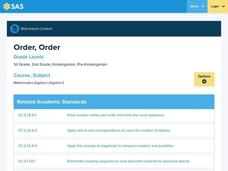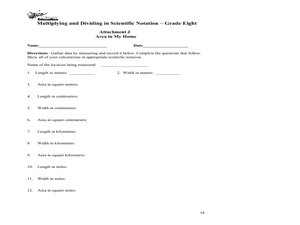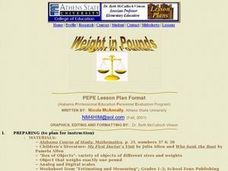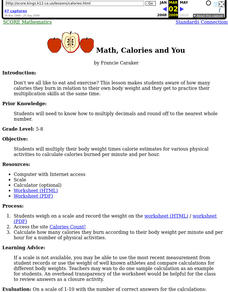Curated OER
Using Random Sampling to Draw Inferences
Emerging statisticians develop the ability to make inferences from sample data while also working on proportional relationships in general. Here, young learners examine samples for bias, and then use random samples to make inferences...
Illustrative Mathematics
Banana Bread
Show your future bakers how to choose the right baking pan by calculating the volume of a pan. The resource compares two pans, one with decimal edge lengths and is too small for the recipe and one that may work. Your number crunchers are...
Curated OER
Students' Strides
Complete problems using base ten blocks to see the difference in the place value of a decimal and how it affects a number's value. Learners compare decimal values as well. Ample time for discussion and modeling are allowed in the...
Curated OER
Finding Addition Patterns
Students practice finding the sums of two-one digit numbers. In this addition lesson plan, students also record facts onto an addition chart.
Pennsylvania Department of Education
Order, Order
Students use pictures to identify items as ordinal numbers. In this ordinal numbers lesson plan, students use the words "before" and "after" to identify the pictures as well.
Curated OER
100th Day Celebration
Students celebrate the 100th day of school with a variety of math and language arts activities based on the number 100. They make books, count objects, and draw their predictions about life 100 years from now. They also estimate the time...
Center for Mathematics and Technology
Whole Numbers: Using an Area Model to Explain Multiplication
There are many ways to work through a multiplication problem. Using an area model, kids complete several worksheets with different types of multiplication problems, including multiplying by ten, and explain how the new strategies differ...
Curated OER
Measuring to the Nearest Inch
Third graders use whole numbers and fractions to make connections between abstractions of the mathematical world and the real world. In this fractions and measurement lesson, 3rd graders identify, quantify groups , and measure distances....
Curated OER
Organizational Patterns: Comparison and Contrast Writing
Students write an essay comparing and contrasting their school experiences. Through guided practice, they create an outline of their elementary school experience and middle school experience. Using their outlines, students synthesize...
Curated OER
Lesson Plan for Fontana Mines
Students estimate and compute with rational numbers. They compare, order and convert among fractions, decimals and percents. Students analyze problems to determine if there is sufficient or extraneous data to solve.
Curated OER
Comparing Fractions
Students use the assistance of computers to explore reducing fractions. Using various internet activities, students experience comparing and ordering fractions. They develop methods to estimate the value of fractions.
Pennsylvania Department of Education
Comparing Sets
Students count back with cubes to model subtraction problems. In this subtraction lesson plan, students compare sets of problems and record their results in a table.
Curated OER
Subtracting Whole Numbers and Decimals
In this math worksheet, students learn to subtract whole numbers and decimals. Students are given step by step directions on how to solve one sample problem, then complete 5 examples on their own. Example: 6.57 - 3.28. There is...
Curated OER
Finding the Percent of a Number
In this mathematics worksheet, 6th graders find the percents of various numbers. They set up the problem, estimate, and write their response. Students also compare their answers to their estimates for each problem.
Curated OER
Time for a Plumber!
Fourth graders compare amounts of time in seconds, minutes and hours. In this multiplying and comparing time lesson, 4th graders problem solve a plumbing problem scenario to find which amount of time is the least. Students share their...
Curated OER
Squares and Square Roots
Students find patterns relating the lengths of the sides of squares to their areas. In this squares and square roots instructional activity, students draw squares and find their areas. They estimate the sides of square when given the...
Curated OER
Aldridge Sawmill -- The Story in Numbers
Seventh graders view a recent transparency of the average rainfall zones of the state of Texas. Using another transparency, they identify the Piney Woods subregion of the Gulf Coastal Plain and locate national forests and sawmills. ...
Curated OER
What a Square
Students examine the painting "Old Man With A Gold Chain" by Rembrandt. They identify geometric shapes in the painting, measure these shapes and compare the relationships of these measurements.
Curated OER
Discovering Pi/Welcome to Pi Day
Students explore pi. In this circle measurement lesson, students define and identify radius, diameter, circumference, and perimeter. Students work in groups to measure several plastic lids and record their findings. Students compare the...
Ohio Department of Education
Multiplying and Dividing in Scientific Notation - Grade 8
Here is really nice set of resources on scientific notation. Eighth and ninth graders explore the concept of multiplying and dividing in scientific notation. In this multiplying and dividing numbers in scientific notation lesson,...
Curated OER
Weights in Pounds
Second graders define "pound," estimate and compare weights, and classify objects as weighing more or less than a pound.
Curated OER
Use Google Maps to Teach Math
Capture the engagement of young mathematicians with this upper-elementary math lesson on measuring time and distance. Using Google Maps, students first measure and compare the distance and time it takes to travel between different...
Indiana Science
How Many E’s?
Seventh graders explore random sampling by estimating the number of e's on the newspaper. They explain the possible error sources for this type of sampling, and compare the accuracy of sampling a small and large population. This is a...
Curated OER
Math, Calories and You
Discover the connection between calories and weight. Pupils multiply their body weight times calorie estimates for various physical activities to calculate calories burned per minute and per hour. Worksheets a well as website links are...

























